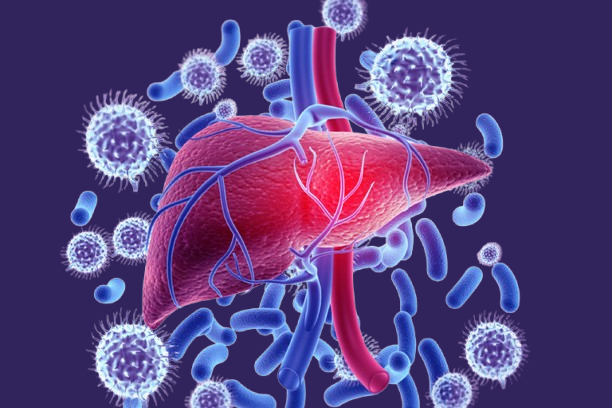Viral Hepatitis
Viral Hepatitis

What is Viral Hepatitis?
Viral hepatitis is a medical condition caused by a viral infection that affects liver cells. The severity of the disease ranges from mild and temporary cases to chronic conditions that can lead to liver cirrhosis or even liver cancer. It is often referred to as "hepatitis epidemic," and it is one of the leading causes of liver cirrhosis. This disease causes swelling and inflammation of the liver and can impact its vital functions.

Types of Viral Hepatitis
There are several types of viral hepatitis, each differing in its method of transmission and its effect on the body:
- Hepatitis A:
This type is usually transmitted through eating food or drinking water contaminated with the virus. People infected with Hepatitis A usually recover completely after a short period, but in rare cases, it can cause acute hepatitis.
- Hepatitis B:
This type is transmitted through blood or body fluids such as semen or saliva. Hepatitis B can become chronic and lead to liver cirrhosis or liver cancer.
- Hepatitis C:
This type is transmitted through contaminated blood and often becomes a chronic infection. Hepatitis C is one of the major causes of liver cirrhosis and increases the risk of liver cancer.
- Hepatitis D:
This type occurs only in people who are already infected with Hepatitis B. It increases the severity of the disease and makes it harder to treat.
- Hepatitis E:
This type is mainly transmitted through consuming contaminated water. Usually, it causes acute liver inflammation and disappears after a short time, but it can be dangerous in some cases.
Causes of Viral Hepatitis
Viral hepatitis occurs as a result of infection with specific viruses that attack liver cells. These viruses include Hepatitis A, B, C, D, and E, and each of these viruses can cause different symptoms and complications. Hepatitis can also result from:
- Alcohol addiction:
which causes liver deterioration and increases the likelihood of chronic hepatitis.
- Toxins or medications:
that can damage liver cells and lead to inflammation.
- Autoimmune diseases:
where the immune system attacks the liver.
Ways of Transmission of Viral Hepatitis
- Hepatitis A and E:
transmitted through eating contaminated food or water.
- Hepatitis B, C, and D:
transmitted through direct contact with infected body fluids such as blood, saliva, and semen. Common transmission methods include using contaminated needles or receiving untreated blood.
Complications of Viral Hepatitis
If viral hepatitis is not treated properly, it can lead to severe complications that may be life-threatening. Among these complications:
- Liver cirrhosis:
Chronic hepatitis leads to liver cirrhosis, which is a permanent deterioration of liver tissue that leads to a loss of liver function. Cirrhosis can cause further complications, such as liver failure.
- Liver cancer:
Chronic hepatitis, especially types B and C, is one of the main causes of liver cancer. If the disease progresses to liver cirrhosis, the risk of cancer increases.
- Liver failure:
This occurs when the liver is severely damaged, preventing it from performing its basic functions, such as detoxifying the blood.
Diagnosis of Viral Hepatitis
Viral hepatitis is typically diagnosed through:
- Blood tests:
to detect different viruses and monitor liver enzyme levels, helping to determine whether the liver is infected.
- Ultrasound:
to examine the liver and detect any damage or enlargement.
- Liver biopsy:
A tissue sample may be taken from the liver to analyze the extent of liver damage and inflammation.
- Antibody tests:
These tests help determine whether a person has been exposed to hepatitis viruses in the past.
Treatment of Viral Hepatitis
The treatment for viral hepatitis varies depending on the type of virus and the severity of the disease:
- Hepatitis A:
Usually does not require special treatment, as the patient generally recovers naturally after a short period, with rest and maintaining fluid intake.
- Hepatitis B:
Hepatitis B can be treated with antiviral medications, such as interferon or other drugs that limit the replication of the virus. Hepatitis B can become chronic and require ongoing treatment.
- Hepatitis C:
Effective antiviral medications are now available that can completely eliminate the virus in most cases.
- Hepatitis D and E:
Hepatitis D treatment depends on controlling the underlying Hepatitis B infection, while Hepatitis E treatment mainly focuses on relieving symptoms.
Prevention Tips for Viral Hepatitis
Viral hepatitis can be prevented by following basic guidelines:
- Vaccination:
It is recommended to receive vaccines for Hepatitis A and B. These vaccines provide effective protection against these types.
- Personal hygiene:
Wash hands frequently and avoid eating contaminated food or drinking polluted water.
- Avoid contact with contaminated body fluids:
Do not share needles or personal items like razors.
- Use condoms:
To prevent the transmission of viruses through sexual contact.
- Avoid alcohol and drugs:
